Table of Contents
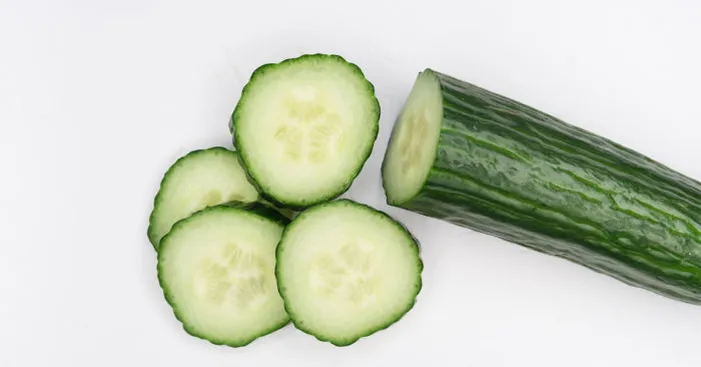
Cucumbers are a delicious and nutritious vegetable with a host of benefits.
Not only are they low in calories and a great source of hydration, but they are also a good source of carbohydrates.
In this blog post, we‘ll be exploring the nutritional benefits of cucumbers and taking a look at the different types of carbohydrates they contain.
We‘ll also discuss how to incorporate cucumbers into your diet in order to get the most out of their carbs.
So, if you‘re looking to get more out of your cucumber intake, read on!
But first, when human beings did first started cultivating cucumbers?
History of cucumber:
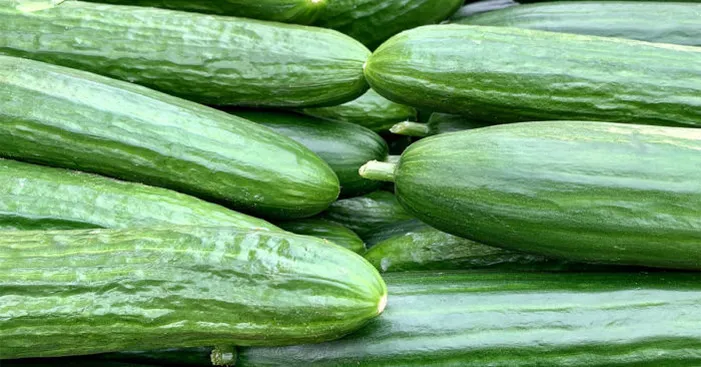
Cucumber is among the “Cucurbitaceae” family alongside watermelon and pumpkin. (1)
One common mistake is to classify cucumbers as vegetables when they are actually fruits, as they contain seeds. (2)
The first mention of the word « cucumber » dates back to the 13th century. (3)
Although, the exact word was “cocombre”, a word borrowed from the Latin “Cucumis or Cucumeris”.
Cucumber is original to Asia and the first domestication took place in India during the first days of human agriculture. (4)
One of those first cultivated plants was the “genus Cucumis” plant which contained two main groups: the African and the Asian groups.
It was the second group of that plant that gave birth to the cucumber, and all its variants, as we know it today.
A couple of centuries later, the cucumber spread from India across all the Himalayan regions.
After that, it reached Greece, Italy, and China where many new cultivars emerged based on the Indian cucumbers.
At first, the cucumber lost its bitterness through the course of selection and became sweeter throughout the time. (5)
As for the USA, it was not until the 16th century that the new European settlers brought cucumber to plant it in America. (6)
Cucumber carbs:
Carbs of cucumbers with their peel on:
These carbs counts for 1 cup (128g) of cucumbers with their peel on: (7)
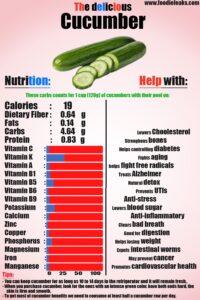
- Calorie: 19
- Fibers: 0.64g
- Fats: 0.14g
- Carbs: 4.64g
- Protein: 0.83g
- C vitamin: 8%
- K Vitamin: 32%
- A vitamin: 8%
- B1 vitamin: 3%
- B5 vitamin: 5%
- B6 vitamin: 4%
- B9 vitamin: 2%
- Potassium: 6%
- Calcium: 2%
- Zinc: 3%
- Copper: 3%
- Phosphorus: 5%
- Magnesium: 4%
- Iron: 4%
- Manganese: 5%
Cucumbers are also a great source of a group of antioxidants such as tannins and flavonoids.
These two antioxidants are molecules that help fight free radicals in the body, the root of many chronic diseases.
This fruit is also rich in many minerals and vitamins including C, K, and A alongside some B vitamins.
Carbs of peeled cucumbers:
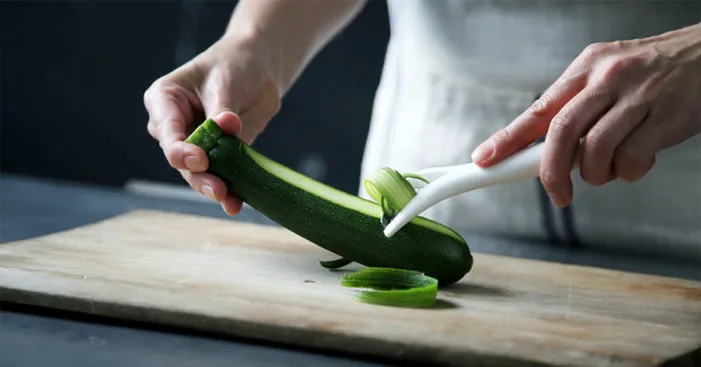
Cucumbers with a coat-like waxy peel, so it’s better to peel them off before eating.
Peeled cucumbers are not necessarily the most nutritious fruits to eat, but they add great value to your diet.
These carbs counts for one cup of peeled cucumbers (128g): (8)
- Calories: 13
- Fat: 0.2g
- Carbs: 2.8g
- Sugar: 1.8g
- Fibers: 0.9g
- Protein: 0.8g
- B5 vitamin: 6%
- K vitamin: 8%
- C vitamin: 5%
- Potassium: 6%
Peeled cucumbers also contain small amounts of copper manganese and magnesium.
Phosphorus, iron, and calcium are also part of the nutrients of peeled cucumbers, but not in large amounts.
Carbs of pickled cucumbers:
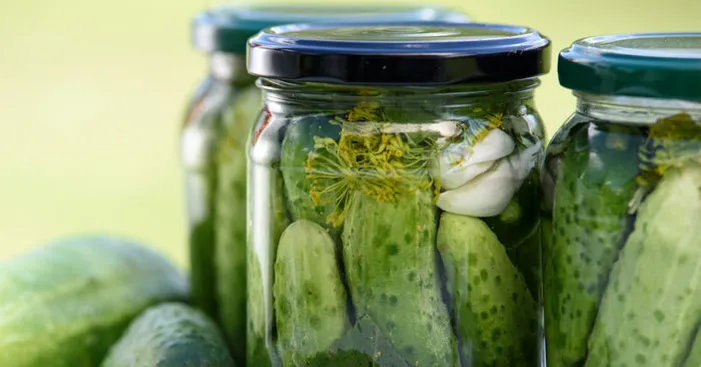
Pickling food is one of the well-known traditional food storage methods, but most people use it to enhance flavor.
When we pickle cucumbers, we put the chopped cucumbers in a glass jar full of brine and let them ferment for several days. (9)
During that time, the healthy bacteria break down all the sugar content which gives pickled cucumber their sourness.
People with lactose intolerance can still consume yogurt due to the same healthy bacteria which break the “lactose” sugar.
These are the carbs in 1 cup (128g) of pickled cucumbers: (10)
- Calories: 15
- Carbs: 3.1g
- Fibers: 1g
- Sodium: 1g
- Protein: 0.7g
- Sugar: 1.3g
These nutrients are the reason why pickled cucumbers are very beneficial to our body.
However, you can enjoy their deliciousness, but you should pay attention to the high sodium content and not overeat.
Benefits of cucumbers:
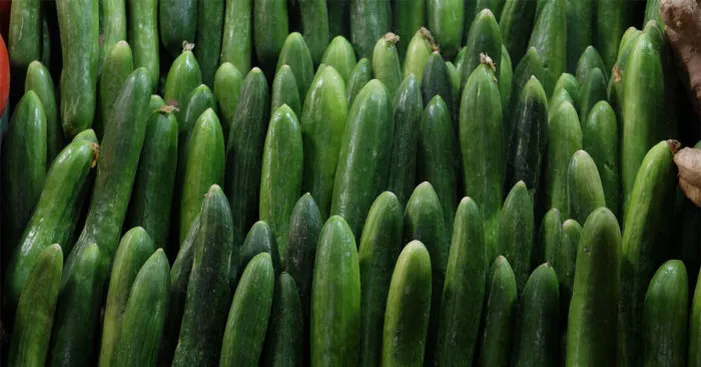
Help losing weight:
With water making up to 95% of its composition, the cucumber is a refreshing fruit with a low-calorie intake.
For those who want to lose or just maintain their weight, this fruit makes you feel fuller for a long time.
Also, the high chewing index of cucumber also promotes the removal of abdominal fat and burns more calories. (11)
Cucumber can also flavor water and motivate people who want to lose weight to drink more flavored water.
May prevent cancer:
The Cucurbitacin, a plant compound that exists in cucumbers, has antioxidant properties which can decrease the risks of cancer. (12)
These same antioxidants of the cucumber can help fight free radicals and prevent the spread of existing cancer.
Clears bad breath:
Once you chew on a cucumber, it releases photochemical substances that would eliminate oral bacteria responsible for bad breath.
Make sure you chew the cucumber for a while to promote abdominal fat loss and removing mouth bacteria at once.
A beauty asset:
Probably cucumbers are one of the most common natural remedies for dark circles under the eyes.
Although, that’s not the only beauty virtue this fruit has as it also helps with skin rash and itching.
This is because cucumbers have anti-inflammatory properties which help decongest the skin. (13)
Not just that, but this fruit is also a good source of Sulfur and Silicon content which stimulate hair growth.
Anti-stress and soothing:
Consuming cucumbers is a good solution for those who often deal with anxiety and stress.
Due to its content of Pyridoxine (vitamin B6), eating cucumbers can calm our mood. (14)
Actually, Pyridoxine is used in certain medicines for children who suffer from anxiety.
Promote heart health:
This fruit is a good source of fibers, magnesium, and potassium, three-component that help stabilize blood pressure.
In addition, once you consume cucumbers with skin on, they provide a type of enzyme called Peroxidase. (15)
This Peroxidase can reduce the level of cholesterol in the blood and so reduce the risk of cardiovascular diseases.
Natural detox:
95% of cucumbers are indeed water, but that is no ordinary water since it’s full of nutrients.
The high potassium content of cucumbers along with its low sodium levels makes it perfect to eliminate toxins in the body.
Once you start consuming cucumbers regularly, it will promote drainage and dissolution of potential kidney stones. (16)
Good for skin and hair:
Even though some people like to peel cucumber before eating, but most of the minerals and vitamins are present in the skin. (17)
Cucumber helps cleanse, moisturize and soothe the skin and works well for any skin type, oily or dry.
It is also used to rejuvenates the skin, fights free radicals, and fights aging.
You definitely have either saw someone/or yourself use cucumber slices to deal with black circles under the eyes.
This is thanks to the anti-inflammatory and antioxidants in cucumbers which reduce and eliminates puffiness.
The peels of a cucumber can relieve sunburns because of their richness in many nutrients.
Being a good source of silicon, consuming cucumbers also strengthens nails and prevents them from thinning and breaking. (18)
Many cosmetics are using cucumbers nowadays especially skin creams and hair products as it stimulates hair growth and brightens the skin.
Benefits the digestive system:
Consuming cucumbers regularly will provide dietary fibers which helps remove toxins and aids digestion.
This fruit is also a good choice to deal with heartburn, stomach infections, and acidity.
Also, it is beneficial in case of constipation as the fibers and waters in cucumber help regulate bowel movements.
Anti-inflammatory:
Cucumber is a natural anti-inflammatory in the body, and here’s why:
- This fruit contains around 95% water and that helps to treat UTIs (urinary tract infections).
- The water in cucumbers is full of nutrients and helps prevents the formation of sand and stones in the urinary tract.
- Among the many nutrients in cucumber is silicon which helps strengthen connective tissue and relieve arthritis and gout pain.
- Cucumber contains vitamin C, B1, B6, A, and minerals, and mixing it with carrot juice, helps to lower uric acid levels. (19)
Useful for diabetics:
Sometimes it really gets annoying for people who have diabetes as their diets seem very limited.
However, cucumber is a great fruit for any diabetic person because of its nutritional composition.
Cucumbers contain a lot of water and dietary fiber and these two can reduce the absorption of sugar.
As a result, consuming cucumbers as a snack is not only delicious but also suitable for diabetics without any restrictions.
By containing manganese and other plant-based compounds that act as hormones for certain pancreas cells.
Eating cucumber regularly will promote pancreas functioning and regulate insulin secretion in the body. (20)
Other benefits of cucumber:
There are still too many other benefits of cucumbers, including:
- Strengthen bones.
- Treats Alzheimer.
- Maintains electrolytes balance.
- Fights intestinal worms.
Possible side effects of cucumber:
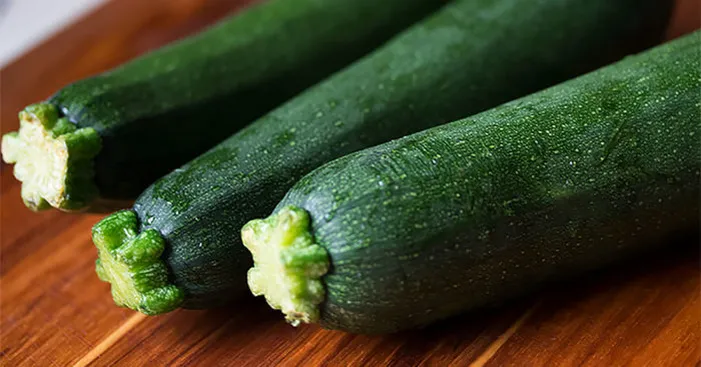
Eating cucumber is generally safe, but it could cause some health complications for some people.
It should be known that certain types of cucumbers are toxic due to their content in cucurbitacins. (21)
Some types of cucumber are difficult to digest, thankfully the traditional types are usually easier to digest.
Also, cucumbers contain high levels of vitamin K which can interfere with some medicines such as blood pressure drugs.
In addition, modern agriculture uses a lot of insecticides which can harm our health.
To ensure that cucumber is safe, it is best to either peel them or wash them with warm water before consumption.
The final side effect of cucumbers is for those who suffer from allergic reactions for a certain group of people.
The American College of asthma allergy and immunology published that people with pollen allergy should avoid cucumbers. (22)
As for the symptoms of an allergic reaction from cucumbers may be itching, rash, and swelling of the lips and tongue.
How to buy the best cucumbers?
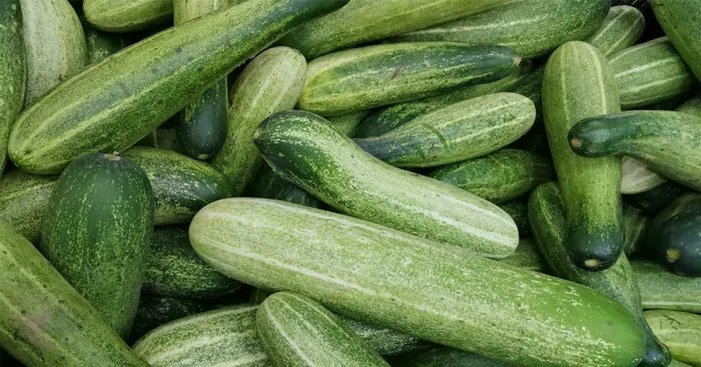
Choosing the best cucumbers is a lot easier than you think, here’s what you need to know:
- This fruit is a green one, so the first piece of advice is to make sure the cucumber has intense green color.
- It should be fresh: to know that you need to make sure that both ends are hard, the skin is firm and smooth.
- Small cucumbers mean fewer seeds on the inside and a more concentrated flavor. (23)
How to store cucumbers?
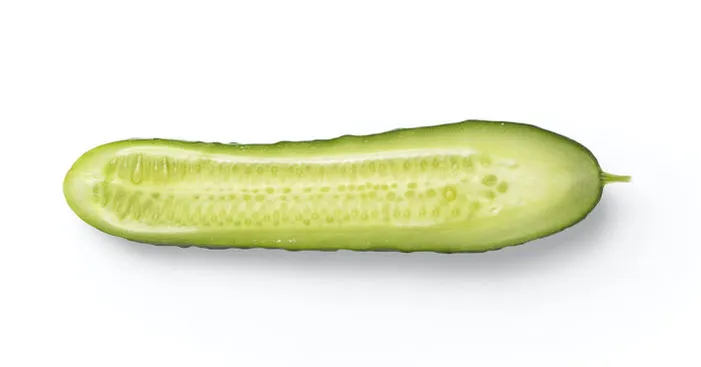
People search for ways to store their vegetables and fruits to extend their lifespan and keep them fresh for longer.
For cucumbers, probably the first advice is to make sure you buy fresh ones (green, smooth and dense texture).
In a refrigerator:
When you get it home, make sure you avoid leaving it in the open air as that fastens their spoiling.
Instead, wash the cucumbers then place them in the vegetable bin of the refrigerator.
You can keep cucumber for as long as 10 to 14 days in the refrigerator and it will remain fresh. (24)
To store half of a cucumber, wrap it with plastic foil before putting it again in the refrigerator and consume it within 48 hours.
In the freezer:
There is another technique some people use to keep that juicy freshness and almost all the nutrients of the cucumber intact.
This is not news, but you can simply freeze the cucumber to store them for several months.
To avoid losing its flavor, wash the cucumber first then cut it into cubes or sticks.
After that, put the pieces of the cucumber spread out on a baking sheet and place them in the freezer for two hours.
Then put them in a freezer bag and put them back in the freezer.
When you need them, take them out of the freezer and put them into the refrigerator for two hours before consuming them.
References:
(1): Cucurbitaceae | Definition, Characteristics, Examples, & Facts | Britannica
(2): Is a Cucumber a Fruit or a Vegetable and Why? | Eufic
(3): The fashionably late arrival of cucumbers in Europe #bad11 (botany.one)
(4): Cucumber History – Origin and History of Cucumbers (vegetablefacts.net)
(5): Selection footprints reflect genomic changes associated with breeding efforts in 56 cucumber inbred lines | Horticulture Research (nature.com)
(6): Cucumber: A Brief History // Missouri Environment and Garden News Article // Integrated Pest Management, University of Missouri
(7): Edit Post “Cucumber carbs: peel on, pickled and peeled + benefits and tips!” ‹ Foodieleaks — WordPress
(8): Cucumber, raw, peeled nutrition facts and analysis. (nutritionvalue.org)
(9): Science of Pickles: The Race of Microorganisms | Exploratorium
(10): Calories in Pickled Cucumber (nutritionix.com)
(11): Your eating speed might be making you FAT (indiatimes.com)
(12): Cucurbitacins – A Promising Target for Cancer Therapy – PMC (nih.gov)
(13): 9 Incredible Cucumber Benefits for Skin ~ Study Backed | Bodywise (bebodywise.com)
(14): High-dose pyridoxine as an ‘anti-stress’ strategy – PubMed (nih.gov)
(15): Tyrosinase inhibitory activity of cucumber compounds: enzymes responsible for browning in cucumber – PubMed (nih.gov)
(16): Are brinjal, beans, cucumber good or bad for kidney disease?/
(17): Why You Should Always Eat Cucumbers With the Skin On | livestrong
(18): Silicon bioavailability in exocarp of Cucumis sativus Linn. – PMC (nih.gov)
(19): Top 10 Foods That Controls Your Uric Acid Levels | Cure Uric Acid Naturally | Foods to Lower Uric Acid Fast (indiatimes.com)
(20): Are cucumbers good for pancreatitis? (thehealthyjournal.com)
(21): Get it Growing: Toxic squash? | Sequim Gazette
(22): Oral Allergy Syndrome | Symptoms & Treatment | ACAAI Public Website
(23): Do Small Cucumbers Have Seeds? – Sweetish Hill
(24): How to Keep Cucumbers Fresh: Tips for Whole or Cut Cukes – 2023 – MasterClass
(25):
